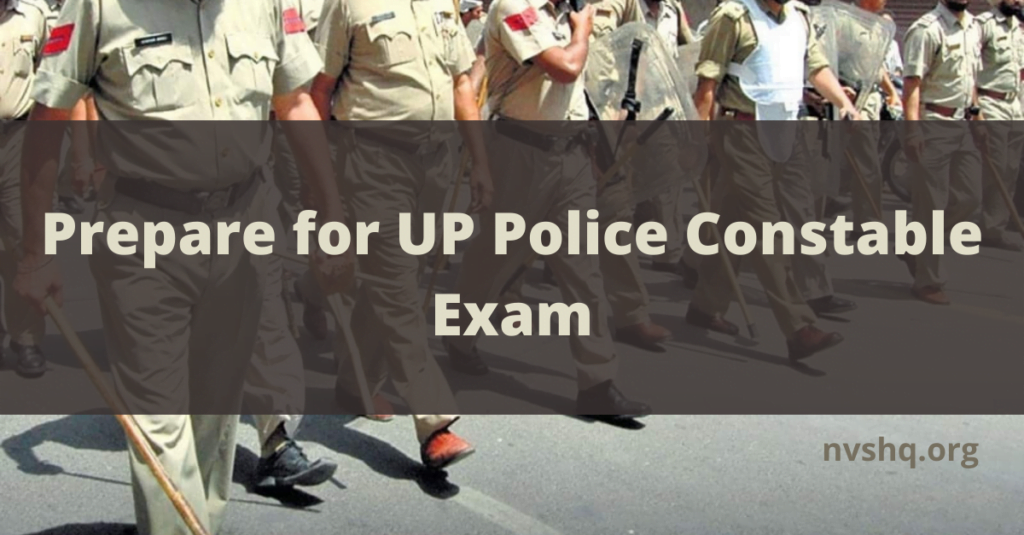How to Prepare for UP Police Constable Exam: The examination for UP Police Constable conducted by Uttar Pradesh Police Recruitment and Promotion Board or UPPRPB is one of the most attempted recruitment examinations. The candidates who are aspiring to be posted as Constable in Uttar Pradesh Police must prepare well so as to get selected. The exam is conducted in order to recruit potential vacancies. The candidates often get confused regarding the preparation for the exam and get under pressure and lose out on their capability to crack the exam. However, it is not at all difficult to ace the exam if you are well prepared and have a definite study plan. If you do not know ow how to do that, do not panic since we have you covered with full-proof plans that will help you qualify for the test. Read the following text so as to gain a definite perspective on how to Prepare for UP Police Constable Exam.

How to Prepare for UP Police Constable Exam ?
The examination for UP Police Constable is a test that is conducted to hire deserving applicants for the post. The UPPRPB generally follows a direct recruitment method while recruiting candidates for the post. Following that, the selection procedure includes the written examination. This test is an Optical Mark Reader or OMR-based test. The candidates who wish to work as Constable in Uttar Pradesh Police must clear the examination so as to go through further selection procedures. The selection will largely depend upon the test. Hence preparing well and studying for it thoroughly is suggested. For that, the students must prepare a study plan and prepare accordingly.
Examination Pattern for UP Police Constable Exam
The candidates must acknowledge the examination pattern for the recruitment test before [preparing for it. There should be complete knowledge of the allotment of marks and time to each section and get an idea of how the question paper would be set. The question pattern also personalized the preparation strategy and a focus area can be easily decided.
The candidates will have to appear for a Written Examination which will be conducted in an offline mode. The questions will be of Objective Type and the candidates shall attempt them in an OMR sheet. In total, 150 questions will be asked and a time period of 2 Hours shall be allocated to the candidates to attempt the examination. For every correct answer, the candidates will be awarded two marks. However, there is a provision for negative marking. The candidates will be penalised for 0.25 marks per response if they answer a question incorrectly. The subsequent paper pattern will be strictly followed by the authorities while setting up the examination paper for the UP Police Constable Exam:
| S.No. | Section | Number of Questions | Maximum Marks |
| 1. | GK or General Knowledge | 38 | 76 |
| 2. | Hindi Language | 37 | 74 |
| 3. | Numerical and Mental Ability Test | 38 | 76 |
| 4. | Mental Aptitude Test or an Intelligence Quotient Test or a Reasoning based section | 37 | 74 |
| Total | 150 | 300 |
UP Police Constable Exam Syllabus
Other than the examination pattern, the candidates should also have profound knowledge of what topics shall be asked by the authorities. The examination paper will not be randomly set. Just as it is following a decided pattern, the questions in it will also be framed for a given set of topics. The syllabus is categorized on the basis of sections and the candidates must observe every topic very carefully:
General Knowledge
- Knowledge regarding India and countries located adjacently to it
- Scientific Progress or Development
- National and International Awards and the recipients
- Languages are spoken in India
- Books and Script
- States and Capitals of various countries across the world, specifically India
- The currency that is prevalent in many countries
- Sports and Athletics knowledge pertaining to the current affairs and major incidents and rules
Hindi Language
- Comprehension Passage and questions pertaining to it and defining a title
- Letter
- Phrases and Idioms
- Usage of typical words in sentences
- Correcting grammatically incorrect Sentences
- Substitution of one word for a sentence
- Antonyms and Synonyms
Numerical and Mental Ability Test
A separate syllabus has been specified for the Numerical part and Mental Ability Test part of the section.
Numerical:
- Number System
- Simplification of Terms and Equations
- Decimal and Fraction
- HCF and LCM
- Ratio and Proportion
- Percentages and Discount
- Profit and Loss
- Interest on amounts: Simple Interest and Compound Interest
- Partnership
- Time, Distance and Work
- Table and Graph Utilisation
- Mensuration and Geometry
Mental Ability Test:
- Logical Diagrams
- Interpretation of relationship between Symbols
- Codification
- Perception and Word formation Test
- Letter and number series
- The analogy of words and alphabets
- Common and Direction Sense Test
- Coding of letters and numbers
- Logical interpretation of Data and Reasoning
- Argument forcefulness
- Determining meanings of implied logic
Mental Aptitude Test or an Intelligence Quotient Test or a Reasoning based section
A specific syllabus is given for every topic:
Mental Aptitude:
- Topics of Public Interest
- Law, Order and Basic Law Rules
- Maintenance of Communal Harmony and procedures and measures of Crime Control
- Ability of Adaptability
- Police System and contemporary issues and law and orders
- Interest and Basic level of Professional Information
- Mental Toughness
- Sensitivity towards minorities, underprivileged categories and genders.
Intelligence Quotient:
- Test of Relationships and Analogies
- Spotting out dissimilar from a pattern of similarities
- Completion of Series
- Coding and Decoding
- Blood Relation Perception
- Problems based on alphabet
- Test of time sequence
- Test of Venn Diagrams and chart types
- Mathematical Ability Test
- Order Arrangement
Reasoning:
- Analogies
- Similarities and Differences
- Visualization of Space
- Problem-solving ability
- Analysis, Judgment, and Decision making
- Visual memory
- Discrimination and Observation
- Relationship and Conceptual Knowledge testing
- Arithmetic reasoning
- Arithmetical number series
- Verbal and figure classification
- Ability to deal with such ideas and symbols that are abstract and observe the relationships between them
- Arithmetical computations
- Various other analytical functions
Preparation Tips
The candidates shall note down the following tips to prepare for the exam. These tips are formulated on the basis of the examination pattern, and the syllabus. Aspirants shall make sure that whatever they prepare should be a part of the syllabus and fall according to the examination pattern.
- Decide a score and declare it as your goal: A person who has no goal can never ace anything. Hence, the best advice that one should follow up on is to set a goal and prepare according to that goal.
- Observe the importance of sections It is important to take note of the examination pattern regarding the scoring areas. Since there is not much mark distribution deviation in the sections, the candidates must equally focus on every section.
- Take it one by one: The best way of preparation is to take things one at a time. There is absolutely no use in rushing to answer two or more topics together. Mastering one concept at a time is the best way of handling things.
- Do not rush: Doing everything but not properly is never better than doing one particular thing but very properly. Hence, whatever you start, do not run to the end. Prepare everything properly without any rush.
- Do not Panic: The most simple and easiest of all is to not panic. Wasting time by panicking not only kills that moment but also impacts the upcoming hours of study.
- Accuracy is better than completion: Completing everything should be the ultimate aim but not at the cost of accuracy. Since negative marking will be in practice, the aim should be accuracy. It is better to do things correctly rather than not attempting them at all.
- Plan on the basis of available time: The candidates must be well informed regarding the time that is left for the preparation. It is better to arrange the study plan according to that.
- Polish older concepts rather than learning new ones: Candidates must observe that they cannot spend most of their time learning new things but actually practising the old ones and polishing pre-existing concepts.
- Model Papers: Model paper and previous year’s questions take your preparation to an upper level by preparing you for the exact standard of questions that are often asked.
- Schedule: Make schedules on how much time and effort needs to be put into a topic depending upon its importance and mark distribution.
- Regular Revision: It is crucial to revise just as crucial it is to prepare. Candidates should make sure that they are able to go through an ample amount of revisions before finally declaring as prepared.
Important Links
| Official Uttar Pradesh Police Recruitment and Promotion Board Portal | uppbpb.gov.in |






